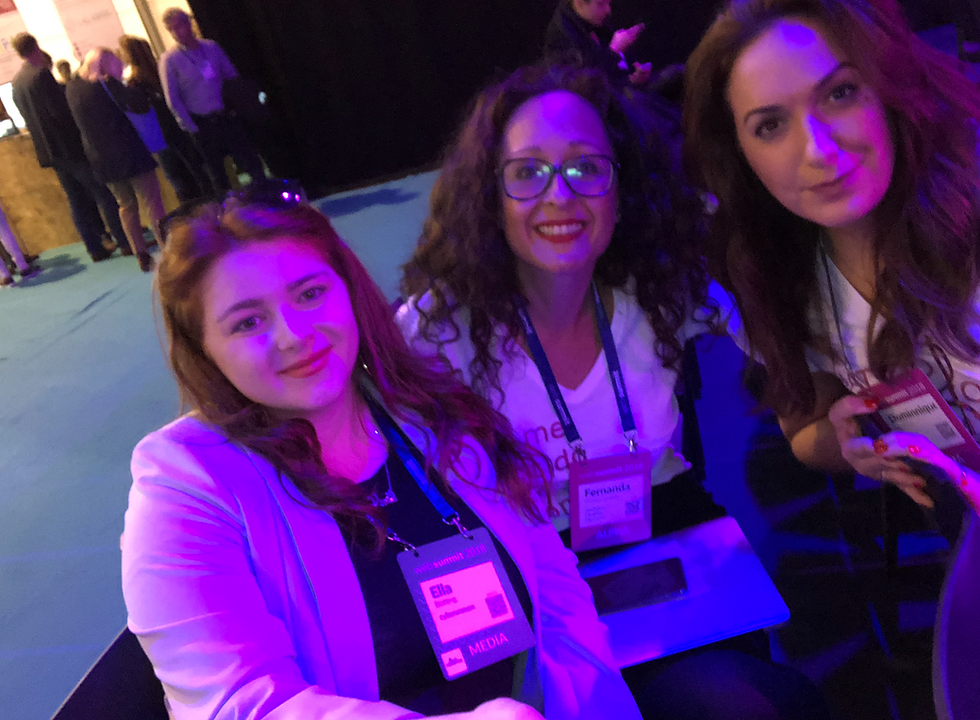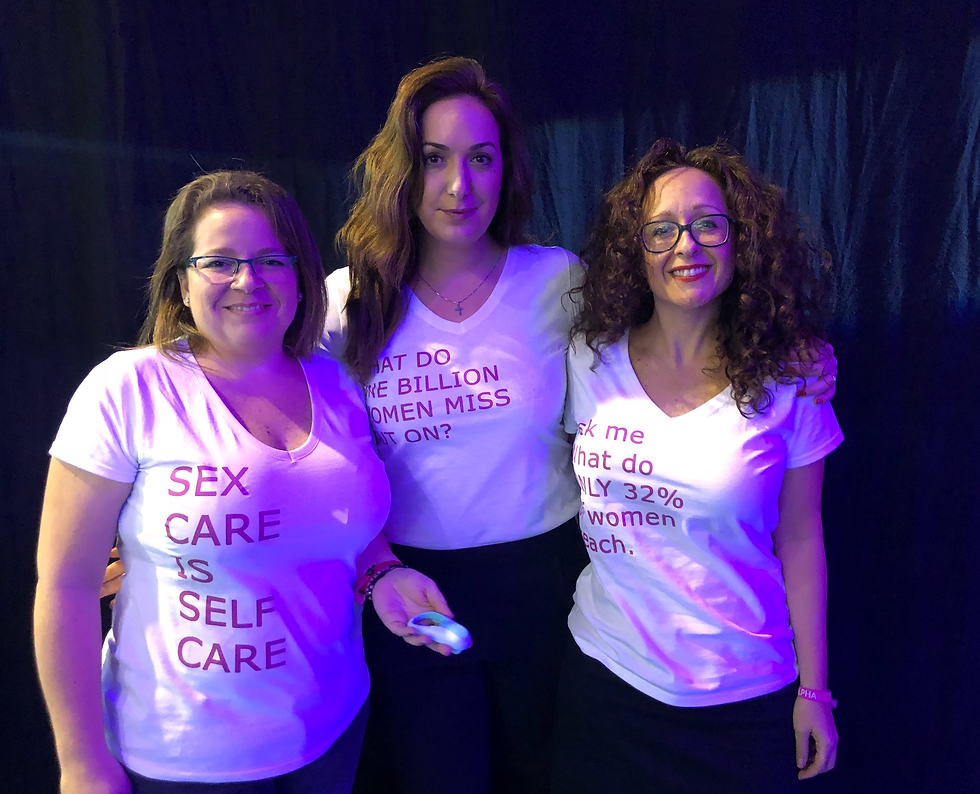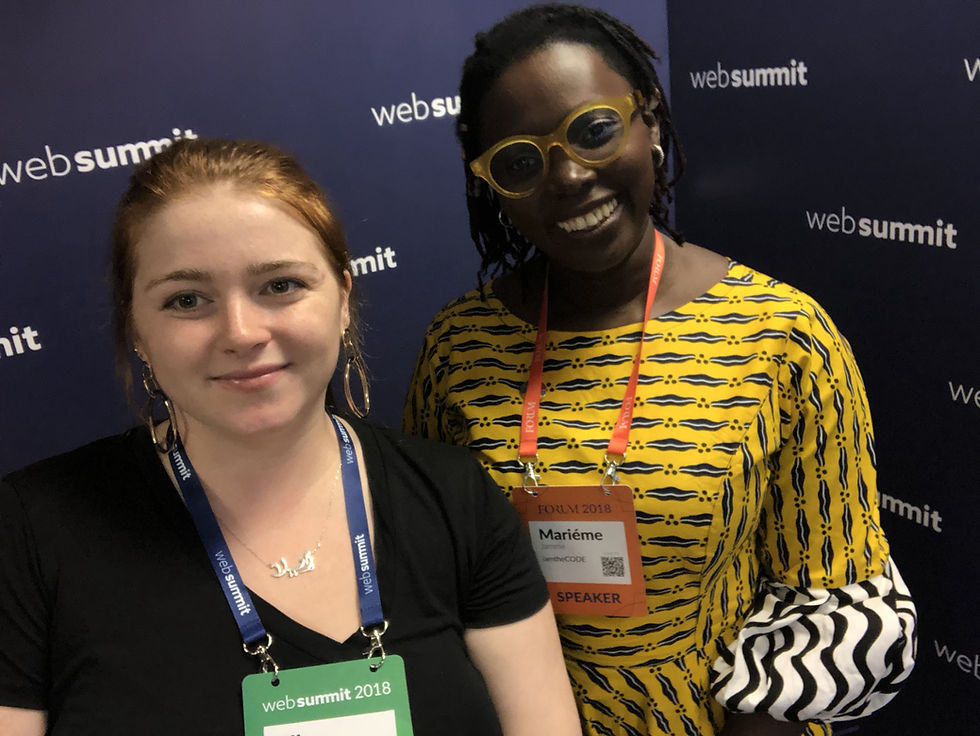#InterviewSeries @ Web Summit | GetMine
- Ella Botting
- Jun 4, 2019
- 8 min read
The #InterviewSeries is a collection of intimate discussions with people who identify as a woman or a non-binary person in the technical & digital spaces.
Back in November I took the #InterviewSeries to the Web Summit in Lisbon, I was fortunate enough to speak to some incredible women in technology and digital. Next up we have the lovely ladies from Healthy Pleasure Collective (HP), Dominnique Karetsos and Dr Maria Peraza . We talked about the #OrgasmGap, how sex care is health care and I was introduced to their delicious innovation, ClitIt.

Do you want to start from the beginning?
I'm Dr. Mafe. I'm from Venezuela, I'm a urologist and a sexual medicine expert. HP began two years ago, the idea was to change the narrative around female sexuality. Today [November 2018] we are showing the public for the first time our device: Clit It. We are very, very excited!
GetMine offers a solution for women health with hands-free technology. Clit It is founded on medical data and my expertise as a doctor. We have a fantastic and wonderful team and we are involved in a new, growing market that is very interesting. We are trying to offer solutions, occupy the space and the bridge the gap that already exists in the narrative about female sexuality. When it comes to female sexuality, we have a huge problem. You hear people talk about women in porn or women in the family planning space. We can't seem have a healthy conversation about women's pleasure. I think it's very important to incorporate in a woman's life, the concept that you can get pleasure and be healthy. Sexuality is a health topic.
Dominnique: That conversation isn't going to be formulated without the help of a device or product or an experience or knowledge or education. I was very fortunate that I met Mafe and fell in love with the concept and the idea. We know in 2017 the most Googled question by women was "why I don't achieve an orgasm.?"
We know that there are lots of new players in the industry. Many women and men who are building products and devices dealing with the pleasure famine.
"Pleasure is healthy. Sex care is health care"
I love that, the pleasure famine.
D: We need to start the story from the beginning. We know that a lot of women don't achieve climax. Which means we would like to provide a device that allows women to explore and discover how to achieve a climax and how to connect consciously with their bodies first. There's so much involved in the dialog online and offline, on social media about other products, sex toys and vibrators vibrators. But most importantly, we are dealing with a woman and her body and her sexuality.
Collectively we designed a device that is effortlessly attached to a woman's body, allows her to forget about her worries and enjoy herself with uninterrupted pleasure. Some people call it self-pleasure, and others call it masturbation. But, what we really need to do is understand the problem first and then provide a solution. We are centuries of compounded frustration. We have an incredible, holistic, empowering sex education, said no one ever.
M: One way to connect with the problem is to look at devices not from a male's point of view. That's a problem for a lot of women, so we designed a device that is not intrusive, it's not phallic. It's based on the vulva and the anatomy of the woman. The device is well thought out. It's simple, we don't have an app or anything else that may distract the women. It's so interesting to now have a device that isn't phallic or an app that tracks your activity. You don't need to track anything, you need to allow yourself to feel. We think that you grow to become a sophisticated person when you learn about your sexuality, your desires and pleasures. Through that journey of using our product, we hope that the users learn to articulate those desires and pleasures.
Women never have the permission to just feel. In the social context, if you feel something, maybe it's wrong and you start questioning yourself. Or maybe you prefer to maintain the status quo and fake orgasms in order to keep your man happy. There are a lot of issues that we are solving with one simple message: healthy permission.
D: Pleasure is healthy.
You talked about it a little bit, but how did you arrive at technology being part of the solution to this problem? Where did that come from?
Dominnique: Technology isn't just the hardware. Our well thought our medical perspective is technical. Technology comes in the future of the product and allows a person to explore and discover. It's about looking how technology may help solve a problem. First we take a look at what is already out there, so we don't compound the issue. Then we look at simplifying the technology and saying right we want something with an ergonomic and anatomical design. Taking away complexities allows us to create a device that allows you to explore and discover. It allows you to start right. You can have a vibrator but if you don't know how to use it or where to put it, or allow yourself permission to say it feels nice, it won't be enjoyable.
We don't want to just slap on another toy. We want to help women and provide a solution. Our technology has to empower and educate women. I always talk about connection with the body because it's a simple way to create a neural brain pathway. It's a cognitive process. Orgasms are just a by product of pleasure, they are a neurological response to stimulus. And in order to have an orgasm you need to know where to place that stimulation. You'll be surprised at the statistics, for example a lot of women don't know that they don't pee out of their vagina.
Pleasure has never had a place in education. You learn that you have a uterus, bleeding and pain. You are warned sign about pregnancy. You are taught about warnings and danger.
Even if you look wider, in society it is still about the dangers associated with sex. The idea that young people [at the appropriate age]may be sexually activate or understand that pleasure can be achieved on their own or with a partner is unimaginable. Imagine the level of self-esteem a young girl could have if she were taught awareness, self appreciation for her body and self love. That we're not fully relying on someone else for that pleasure and most importantly, validation.
Your sexuality is strongly linked linked with how fulfilled you feel in life. If you had clear and healthy conversations about this stuff regularly - I don't know, I think it could be amazing. There are well-known studies that show that women with the highest scoring sexual satisfaction are able to make better decisions, have more foresight and are simply happier. I think we need to return to basics and that requires education. We do know that this level of inequality has a huge impact on the world. We know from statistics that the world is a better place and solutions are found quicker when women feel strong and empowered. That's our dream. From a grand perspective and from a product perspective, we focus on the woman. She is our core and her sexuality is who we pay honour to. We echo the ability to have a safe space to explore and discover.
Clit It is the first product to be recognized in the health sector. That's a huge step in the right direction. We're moving away from it being a toy or vibrator. This is bigger. This is about women's health. We can't wait to incorporate a product like this into everyday life and see the impact on people's well being. We're really grateful to Women's Summit because they get it. We're not just a vibrator. We're here to talk about you and your body. You couldn't have made it any simpler for you to experience your own pleasure. That's a great starting point and the industry's gone, "Yeah, we get it."
"We don't want to just slap on another toy. We want to help women and provide a solution. Our technology has to empower and educate women"
Well guys, this is incredible I have a couple more questions. Coming up in the industry, were you faced with challenges that a man may not?
D: Of course. Looking at it from a fundraising perspective, we know that women get less money than men. And we deal with the word sex. So, you can imagine how much smaller that proportion is. There's that challenge. The other challenge is that we're dealing with a taboo subject. People don't want to talk about sex. They don't want to talk about sexuality or even consider that having a healthy sex life means a healthy living.
In business, we have the same blockers and barriers when talking to retailers or mainstream channels, how do I position this product? How do I sell this product? We meet the same challenges, but it's harder because it's about sex. I’d like to think that it’s changing. It is changing. But, is it changing fast enough? No, and I think thats because of both women and men. We have credible men on our team as well, and they have a pivotal role to play.
M: We can’t let go. We can’t take our foot off the pedal. It’s not easy being a woman asking for money for women's health issues. And it's even worse because that health issue is sexual.
D: Remember, in business, solutions are often found when the people in power are able to identify with that problem and men are predominantly sitting at the board. The fact that a woman can’t have an orgasm is not on his radar enough to spend months on figuring out that solution. When you put more women in power this issue comes to light and they want to solve it and you will see the shift in demand.
M: And in the background, there is always the, "When are you going to get a real job?" question. Imagine, I’m a urologist, I am fighting everyday for female sexuality and then for a colleague to say something like that.
"Looking at it from a fundraising perspective, we know that women get less money than men. And we deal with the word sex. So, you can imagine how much smaller that proportion is. So, there's that challenge."
What gives you that energy to continue? How do you keep fighting?
D: Well, for me it’s an inward look. I go inwards and I break it down because the story is really big. Then when you break it down, for example, for me I have a daughter, so I look at my daughter and I imagine a completely different life with a connection to your self-esteem and that's what I want that for her and every other daughter. Every woman should have that. I’m living that journey so I learn from my own journey, for me it’s very personal.
M: I'm a dreamer of course and I fully believe that individual change can make a collective difference. If I can change one person, It's worth it for me. I need a better society for women.
D: The idea is that we’re helping and empowering a woman to communicate better to her partner, so that she’s inclusive because guess what, we have to take control of our own pleasure. We can't rely on someone else and then blame them.
I should have guessed that! My final question is for people that may be starting out, they’ve just finished university or they’re coming in to this industry or space, what would you advise them to do or what do you wish you had done differently? How can we motivate other people or other women?
M: We need more woman, especially in my field. I'm a surgeon and I'm a urologist and I take these topics very seriously because I am a woman.
D: We can contribute in so many different ways. You can be a sex therapist, you can be a sexologist in medical science and therapy science, innovation technology. In cybersecurity, there is a huge question mark around whether sex apps are safe. You can take any career and input it into this industry because it’s still so new and we’re hungry for innovation and for integration and that doesn’t just come from women. We're the oldies in the industry, so we look for a team to show us how we can do things even better.




Comments